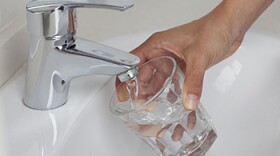The Lewes Board of Public Works has found elevated levels of lead in the drinking water of three homes. That’s out of ten samples taken roughly three weeks ago.
The EPA’s Action Level for lead is 15 ug/L, but there is no safe concentration in drinking water. According to the state Division of Public Health, lead concentrations in the ten samples taken in Lewes Board of Public Works’ service area ranged from non-detect to 38.4 ug/L.
Ingestion of lead can damage the brain and kidneys. It is especially dangerous for infants, children and pregnant women, and can cause lower IQs in children. Once ingested, it stays in bones and can be released later in life.
Prior to the samples taken August 9, the last time residential lead levels were tested in the service area was August 2015.
Lewes Board of Public Works General Manager Darrin Gordon says the board is still looking into whether the lead in this month’s samples came from Public Works service lines—which lead from mains to individual buildings—or plumbing inside the homes.
Gordon says none of the Board’s mains are made of lead.
Though he’s not sure where all of them are, he estimates 15 to 20 percent of the service lines are still made of lead.
“When we did these last ten samples, we tried to select from areas that we had higher confidence were in lead service areas. So we have taken a very cautious an effort as possible in our testing,” he said.
The Board has been working to replace lead service lines.
“Already we’re aggressively moving forward, we’ve got $850,000 which for us is a lot of money, already we’re attacking Pilottown Rd," he said "We have other areas we’ll be attacking as well and our board may look at stepping that up."
Gordon said this started in 2016 which replacement of lead service lines on Savannah Rd.
Gordon declined to say which addresses had elevated lead levels out of respect for the privacy of the residents.
Gordon says because of the elevated results, the Board has sampled schools in the service area— and is working to get those results back before the first day of school next week.
He says the water is also being tested for corrosivity. He says results of additional testing should be available in the next few months.
The Lewes Board of Public Works has been testing for lead every three years—but will now test every six months until the samples are clean.
Gordon says people living in homes built after 1988 can be confident their water is safe to drink. He says those living in older homes may want to let tap water run for thirty seconds before drinking it.
Bathing and showering in lead-contaminated water is considered safe. There is no safe consumption level.
Running a tap for 30 seconds before using water can lower the risk of ingestion— as well as using cold rather than hot tap water. Boiling drinking water does not remove lead.
The state Division of Public Health recommends concerned residents should have their water tested through an EPA-drinking-water-certified laboratory.
Gordon says the Board will work with concerned residents to get questions answered.






